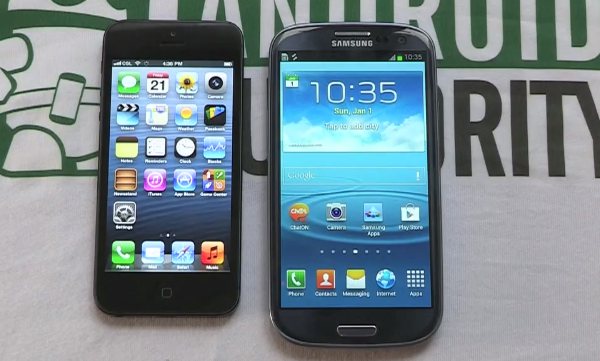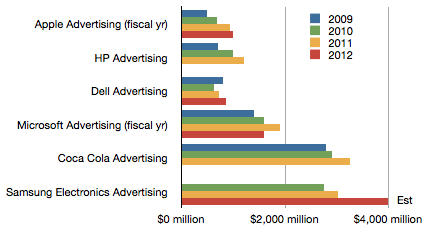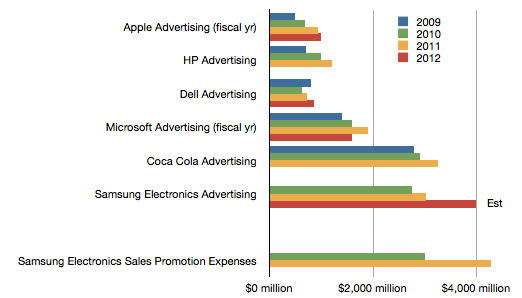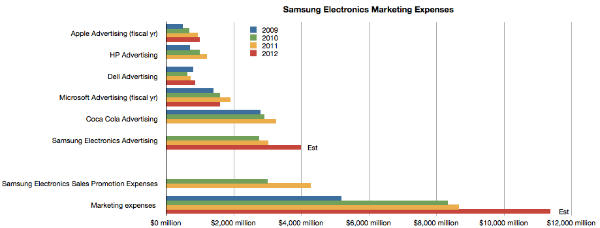Affiliate links on Android Authority may earn us a commission. Learn more.
How much does it cost Samsung to sell millions of Galaxies?

‘Think Different’ ad creator says Samsung’s new commercials are better than Apple’s ads, a result of huge ad spending from the South Korean company over the years which paid for some clever writing.
Clever writing
You may not know Ken Segall by his name, but you certainly know some of its work, as you have undoubtedly seen various Apple ads he helped create, including the aforementioned 1997 “Think Different” Mac campaign.
While he no longer works at TBWA/Chiat/Day, the advertising agency in charge of Apple’s TV ads, he did share his opinions on the Samsung vs Apple fight when it comes to recent TV ad campaigns.
In a post titled “Apple battling where it used to crush,” Segall says that Apple is having a tough time in getting its message across, with Samsung’s ads getting a lot of momentum these days.
While Apple still focuses on its products in its 30-second short TV ads, Samsung has a completely different strategy for its media attack. The Android device maker is focusing on people instead of devices, telling funny stories and taking plenty of hits at the competition – mostly Apple – in its ads, which ultimately become viral videos.
Unsurprisingly, just a few months ago we learned that a Samsung Galaxy S3 ad became the most viral commercial of 2012, with other Samsung Galaxy ads also present in that top 10. Even if Samsung’s style can be criticized for the way it takes some hits at potential customers, at the end of the day, the ads are still hilarious and therefore they’re helping Samsung deliver its messages across.
More recently, Samsung has pulled out all the stops on an expensive Super Bowl series of TV ads starring Paul Rudd, Seth Rogen and LeBron James. Then it had director Tim Burton appear in a Unicorn Apocalypse commercial that aired during the Oscars a few days ago (above,) with the ad being a special episode in Samsung’s SAFE TV ads.
Comparatively, Apple has released a short 30-second spot during the Oscars (below,) and did not plan anything special for the last Super Bowl edition.
However, while Segall says that Apple is not buzzing as it used do, he expects Apple to “recalibrate” in the future.
Huge ad spending
What’s interesting in this piece coming from Apple’s former ad man is a reference to Samsung’s ad spending practices compared to Apple’s. While Segall doesn’t provide numbers himself, he does point us in the right direction – to an Asymco post from late November, 2012, in which Horace Dediu looked into “the cost of selling Galaxies.”
And in case you were wondering, Samsung does spend an awful lot of money for advertising purposes. According to advertising data that’s available in earnings reports, Samsung outspends some major corporations out there including Apple, HP, Dell, Microsoft and even Coca Cola.

Dediu estimated that Samsung would spend $4 billion on advertising in 2012, roughly a billion more than in the previous two years, while Apple spent about $1 billion on ads, a number slightly up from previous years.
He also noted that in addition to high advertising costs, Samsung would also be spending a lot of cash on “commissions and ‘sales promotions.’” These costs amounted to over $4 billion in 2011, while an estimate for 2012 was not available. However, considering that Samsung increased its advertising budget each year, it would have been logical to assume that the company spent well over $4 billion on those “commissions and ‘sales promotions’” as well in 2012.

In case you’re not keeping track of the total amount of cash Samsung was expected to have paid on marketing last year, Dediu’s report offers us the bigger picture: the company was estimated to have spent around $12 billion in 2012 on “Marketing Expenses:”
The company also reports “Marketing Expenses” every quarter. These figures appear to be the sum of Ad spending, Sales Promotions, Public Relations and a portion of “other” expenses as a part of SG&A.
We will note that the $12 billion number referred to Samsung’s entire business and not just its mobile division, but it wouldn’t be far-fetched to assume that the bulk of those “Marketing Expenses” goes to Galaxy-related ads and promotions every year. After all, the mobile division brings in most of the cash, so it does require plenty of advertising.
Since Dediu published his report, Samsung released its Q4 2012 and FY 2012 earnings report, pretty much confirming that Marketing Expenses estimate. In fact, Dediu had Samsung spending anywhere north of $11.38 billion on promoting its products, and Samsung actually spent $11.95 on those Marketing Expenses.
It’s abundantly clear that Samsung is willing to pay a lot of money to make a lot of money – Marketing Expenses account for 6-7% of sales according to earnings reports – so we shouldn’t be surprised to see the company atop of the Android universe and of the mobile business. And from the looks of it, Samsung will do whatever it takes to sell plenty of Galaxies each year, even if that means pouring more billions on advertising purposes, so don’t expect anything to change in 2013 either. Just look at the last graphic above: Samsung spent over $30 billion to market its products from 2009 to date, with most of that cash most likely promoting Galaxy smartphones and tablets.
And with that kind of a budget, we shouldn’t be surprised to see that those Galaxy and/or Unicorn ads work very well in Samsung’s favor. After all, 72andSunny, the ad agency in charge of Samsung’s ads, must deliver results to keep receiving those huge paychecks – we will note though that while we can look at Marketing Expenses in earnings reports, we don’t know exactly how much Samsung pays its ad agencies for the commercials we see on a regular basis.
Nor should we be surprised to hear that “Galaxy” means “Android” for some people or that Samsung reportedly wants to sell 100 million Galaxy S4 units this year. Or that Google is worried about Samsung’s hold of Android.
Since we did mention 72andSunny, it’s worth pointing out that the agency will be in charge of Google’s Chromebook ads in the future, replacing BBH, so we can expect the Search giant to release some interesting commercial in the coming months. But we’ll talk more about them when the time comes.
As for Samsung, should the company be blamed for outspending the competition on promoting new products? Definitely not, as each company is entitled to go about its business as it sees fit (keep in mind that, while we focused only on the marketing side of the Galaxy-device-selling business there are plenty of other costs involved in selling those millions of units each year). And we can’t but wonder whether anyone else in the Android ecosystem has the willingness to invest the same kind of cash on marketing Android products in the foreseeable future.
